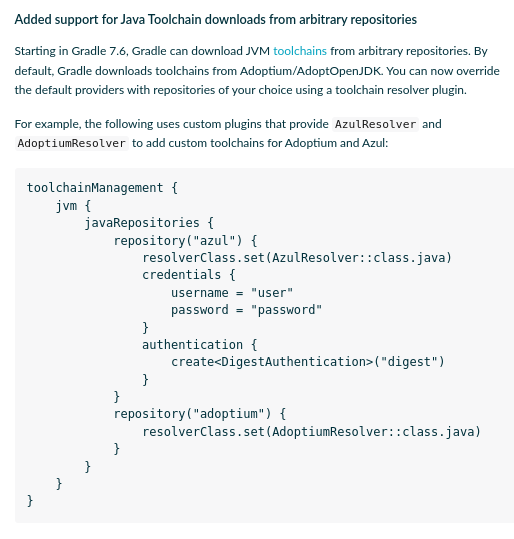Ali_RS
January 12, 2023, 2:36pm
21
…so somewhere between JDK11 and JDK18, the ByteBuffer.clear():ByteBuffer override was added.
It is added in java 9 I think.
That is what I am suspicious of too, but our GitHub actions built JME for maven publishing with java 8 and I can confirm that jar is built with java 8.
1 Like
pspeed
January 12, 2023, 2:37pm
22
I don’t see how it can be anything else.
clear():Buffer and clear():ByteBuffer are two different methods. One exists in JDK8 and the other doesn’t.
Ali_RS:
It is added in java 9
That’s weird because it is not in JDK11:https://docs.oracle.com/en/java/javase/11/docs/api/java.base/java/nio/ByteBuffer.html
How?
1 Like
Pavl_G
January 12, 2023, 2:38pm
23
What type of JDK-8 ? The docs above are oracle’s only.
Pavl_G
January 12, 2023, 2:39pm
24
Yeah, i glanced JDK-8 docs and sources and can confirm this override is new, it isn’t on jdk-8.
Ali_RS
January 12, 2023, 2:41pm
25
pspeed:
How?
javap -verbose BufferUtils.class | grep major
major version: 52
pspeed
January 12, 2023, 2:43pm
26
That’s only telling you that the class format is JDK8 compatible. It says nothing about what JDK libraries it was compiled against.
The method was added in JDK13.
JDK12: ByteBuffer (Java SE 12 & JDK 12 ) ByteBuffer (Java SE 13 & JDK 13 )
So JME is being compiled with a newer java and is maybe missing some source version setting.
Edit: and note that I think after JDK10, the sourceCompatibility setting no longer works?
I have this in my builds to try and be 1.7 compatible for SimMath, for example:
And a similar thing in my buildSrc arranged projects:
1 Like
Ali_RS
January 12, 2023, 2:52pm
27
Maybe something going crazy with Github’s actions.
But looking at the workflow run summary, I see only artifacts built with jdk8 on ubuntu are uploaded to maven:
Build jMonkeyEngine #1999
2 Likes
Pavl_G
January 12, 2023, 2:55pm
28
Does re-running the java-8 build action only and watching it, may help to diagnose the problem or to track the script ?
pspeed
January 12, 2023, 3:00pm
29
I didn’t see anything in the logs that confirms that JDK8 was what’s being used other than that the job is called “Build on JDK8”.
…I presume it’s also not possible that other versions are overwriting the JDK8 version before it gets uploaded.
Ali_RS
January 12, 2023, 3:01pm
30
Well, the logs are already there
Setup java environment
0s
Run actions/setup-java@v3
with:
distribution: temurin
java-version: 8
java-package: jdk
check-latest: false
server-id: github
server-username: GITHUB_ACTOR
server-password: GITHUB_TOKEN
overwrite-settings: true
job-status: success
token: ***
Installed distributions
Resolved Java 8.0.352+8 from tool-cache
Setting Java 8.0.352+8 as the default
Creating toolchains.xml for JDK version 8 from temurin
Writing to /home/runner/.m2/toolchains.xml
Java configuration:
Distribution: temurin
Version: 8.0.352+8
Path: /opt/hostedtoolcache/Java_Temurin-Hotspot_jdk/8.0.352-8/x64
Creating settings.xml with server-id: github
Writing to /home/runner/.m2/settings.xml
1 Like
Pavl_G
January 12, 2023, 3:01pm
31
I guess this is the issue, updating to gradle 7.6 always requires JDK-11+, so jdk-8 is ignored in this case:
Build jMonkeyEngine #1999
Gradle automatically relies on adoptium open-jdk if it doesn’t exist, it’s installed by default.
1 Like
Ali_RS
January 12, 2023, 3:04pm
32
Is this mentioned somewhere on their release note?
1 Like
Pavl_G
January 12, 2023, 3:06pm
33
Pavl_G:
adoptium
I think yes, however you can test which java is your gradle using, add gradle --version before the running script and concatenate using && with the build script.
└──╼ $gradle --version
------------------------------------------------------------
Gradle 7.6
------------------------------------------------------------
Build time: 2022-11-25 13:35:10 UTC
Revision: daece9dbc5b79370cc8e4fd6fe4b2cd400e150a8
Kotlin: 1.7.10
Groovy: 3.0.13
Ant: Apache Ant(TM) version 1.10.11 compiled on July 10 2021
JVM: 17.0.5 (Debian 17.0.5+8-Debian-2)
OS: Linux 5.10.0-18-amd64 amd64
pspeed
January 12, 2023, 3:08pm
34
And if gradle is configured properly then it “shouldn’t” matter. Need to figure out where to add the configuration I linked above to our JME builds. I’ve never really understood our gradle setup so I don’t know where exactly to look.
Edit: probably in common.gradle
Easy to try.
1 Like
Pavl_G
January 12, 2023, 3:09pm
35
EDIT:https://docs.gradle.org/7.6/release-notes.html
1 Like
Pavl_G
January 12, 2023, 3:17pm
36
1 Like
pspeed
January 12, 2023, 3:22pm
37
Before messing with the tool chains…
Try adding:
compileJava { // compile-time options:
options.encoding = 'UTF-8'
options.compilerArgs << '-Xlint:unchecked'
options.deprecation = true
if( JavaVersion.current().isCompatibleWith(JavaVersion.VERSION_1_10) ) {
options.release = 8
}
}
…or similar to common.gradle and see what happens.
Edit: because note that I build my stuff on JDK18 these days and Mythruna will still run on Java8 just fine.
2 Likes
Pavl_G
January 12, 2023, 3:50pm
38
@Ali_RS I added a new PR to do some testing:
jMonkeyEngine:master ← JMonkey-Archive:enforce-java8-build
opened 03:45PM - 12 Jan 23 UTC
I am going to test the gradle version to which java it consumes and find an answ… er through github actions to suggest a fix.
1 Like
Pavl_G
January 12, 2023, 4:00pm
39
I have added gradle --version at the beginning of the bash script, here is the result:
------------------------------------------------------------
Gradle 7.6
------------------------------------------------------------
Build time: 2022-11-25 13:35:10 UTC
Revision: daece9dbc5b79370cc8e4fd6fe4b2cd400e150a8
Kotlin: 1.7.10
Groovy: 3.0.13
Ant: Apache Ant(TM) version 1.10.11 compiled on July 10 2021
JVM: 1.8.0_352 (Temurin 25.352-b08)
OS: Linux 5.15.0-1030-azure amd64
This means that gradle already uses java-8.
Build jMonkeyEngine #2000
1 Like
Ali_RS
January 12, 2023, 4:06pm
40
And I made a PR with Paul suggestion
jMonkeyEngine:master ← Ali-RS:fix-issue-1896-2
opened 04:01PM - 12 Jan 23 UTC
This will keep java 8 compatibility when it is compiled with newer java versions… .
Fix #1896
1 Like
